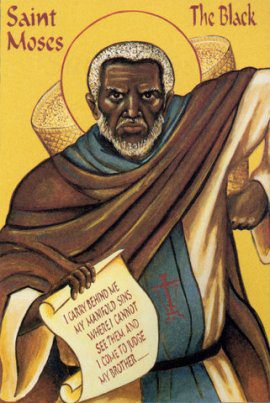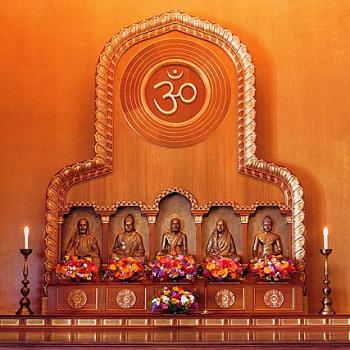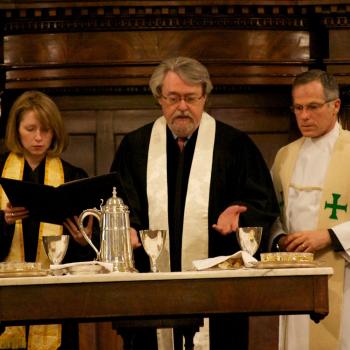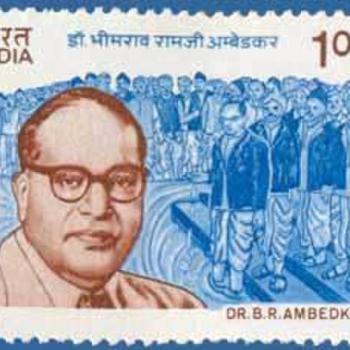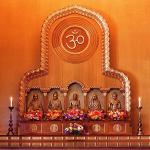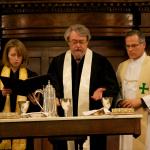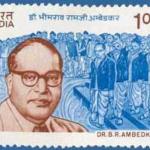It is the 28th of August. In the Christian calendar a lot of people are celebrating today as a feast for Augustine of Hippo, bishop and theologian. And, let’s be frank, while there is much about him that is attractive, his approach to the idea of an original sin and our humanity simply drips with Manichaeanism, and has been the source of much of Christianity’s more unhealthy attitudes about how we exist in the world. Let’s just say, he’s not my guy.
Rather my attention for this day goes to Abba Moses the Black.
One of those books to which I return over and over is the Wisdom of the Desert by Thomas Merton. It recounts some of the teachings of the desert fathers and mothers, Christian monastics in the fourth and fifth centuries who lived in the Egyptian deserts. Their stories on occasion recall the sayings and actions of the Chan masters of Medieval China.
Actually, it was a small sadness when I started reading other versions of those lives and it became obvious Father Merton had carefully curated his collection and even slightly reworked an account or two to enhance that sense of similarity. Nonetheless the book is a source of genuine wisdom, and one of my consistent guides on the way I walk. And, I recommend both that book, well, most of all that book, but also visiting the more “authentic” accounts, as well. They, too, are past interesting to those who care about the great struggles of the spiritual way.
Among the figures who grace Father Merton’s book and the literature of the Desert monastics is Abba Moses the Black.
His life is celebrated liturgically in pretty much all the older churches as well as among the Lutherans and Anglicans, in the East on the 1st of July, and, today, the 28th of August in the West.
Abba Moses appears to have started out as a fourth century Nubian slave who became an Egyptian gang leader. He was a thief, and possibly a murderer. But out of an encounter with a desert monk, he repented his wasted life, and joined the community.
There he slowly gained fame for his holiness and wisdom. Two stories, my own paraphrases from the collections:
Once he was called to join in the trial of a brother. He took a large bag of water slung over his shoulder as he walked. It had a small hole causing it to leak as he walked. When he arrived as he had been ordered and told help render judgment, he replied, “I walk along with my sins spilling out behind me. How can I possibly judge another?”
On another occasion during a time set aside for fasting, traveling monks arrived at his hut. He immediately invited them in, and set to cooking them a simple meal. When a fellow monk saw that he was eating during a fast he complained to their abbot. The abbot replied that Moses was faced with obeying their human made rule to fast, or God’s commandment to hospitality, and made the only right choice.
For me these are illustrations of someone who has found something genuine, and is conveying it the only way one really can, in all the choices he made in his lived life.
Eventually a community gathered around him, which was said to grow to include seventy-five monks, the same number as had been in his gang. At some point Abba Moses was ordained a priest.
The abba died a martyr in 405, when he refused to leave his monastery as a Barbarian hoard descended on his community.
There are, no doubt, many Christianities. Perhaps a different one for everyone who cares. Actually I believe this is true no matter what the religion it is we each of us profess. I think of Father Merton’s religion as presented in his little book, and my heart is stirred. And my own path is illuminated. A way is pointed. All I need do is put my own feet into motion.
And I look at some of those people he showed us as guides for our own walk, and I remain so grateful. Among them, Abba Moses certainly is one showing that way with enormous heart.
Revealing a love that stands above all creeds.
And that is one thing of which I am sure. If your religion doesn’t manifest in love, you’ve made a terrible mistake.
Of course there’s more to it. For me it is mostly about a letting go, a surrender. But. But.
Somewhere in the mystery of our being, within the cloud of unknowing that love is the search and it is the finding. That’s the message.


